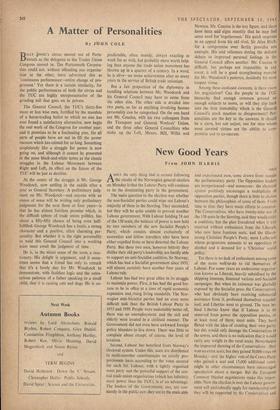A Matter of Personalities
By JOHN COLE BILLY 5MART'S circus moved out of Ports- mouth as the delegates to the Trades Union Congress moved in. The Portsmouth Corpora- tion could not, without offending one organisa- tion or the other, have advertised this as 'continuous performance—entire change of pro- gramme.' Yet there is a certain similarity, for the public performances of both the circus and the TUC are highly unrepresentative of the grinding toll that goes on in private.
The General Council, the TUC's thirty-five more or less wise men, fortified by the mandate of a horse-trading ballot to which no one has ever found a satisfactory alternative, now begin the real work of the Congress for another year; and it promises to be a fascinating year, for all sorts of people have set out to fill the power vacuum which has existed for so long. Something suspiciously like a struggle for power is now going on, and although it cannot be presented in the same black-and-white terms as the classic struggles in the Labour Movement between Right and Left, its effect on the future of the TUC will be just as decisive.
At the centre of the struggle is Mr. George Woodcock, now settling in the saddle after a year as General Secretary. A preliminary judg- ment on Mr. Woodcock—and anyone with an ounce of sense will be writing only preliminary judgments for the next three or four years—is that he has almost limitless promise which, in the difficult sphere of trade union politics, has about a fifty-fifty chance of being even half- fulfilled. George Woodcock has a brain, a strong character and a positive, often charming per- sonality. But whether it is the right personality to weld this General Council into a working team must await the judgment of time.
He is, in the nicest sense of the term, a reac- tionary. His delight is argument, and it some- times seems that a friend has only to remark that it's a lovely day for Mr. Woodcock to demonstrate, with faultless logic and the osten- tatious patience of a father speaking to a small child, that it is raining cats and dogs. He is tin- predictable, often moody, always exacting to work for or with, but probably more worth help- ing than anyone the trade union movement has thrown up in a quarter of a century. In a word, he is alive—no mean achievement after so many years in the service of British trade unionism.
But a fair proportion of the diplomacy in handling relations between Mr. Woodcock and his General Council 'may have to come from the other side. The other side is divided into two parts, so far as anything involving human personality can be categorised. On the one hand are Mr. Cousins, with his two colleagues from the Transport and General Workers' Union, and the three other General Councillors who make up the Left, Messrs. Hill, Willis and Newton. Mr. Cousins is the key figure, and there have been odd signs recently that he may feel some need for 'togetherness.' His quick response to an appeal from his old rival, Sir Alan Birch, for a compromise over Berlin provides one example. His odd reference during the defence debate to improved personal feelings in the General Council offers another. Mr. Cousins is difficult, but perhaps not impossible; in any event, it will be a good strengthening exercise for Mr. Woodcock's patience, decidedly his most suspect virtue.
Among these confused elements, is there room for negotiation? Can the people in the TUC hierarchy find enough common ground on enough subjects to move, or will they slip back into the firm immobility which is the General Council's stock reaction to disagreement? Per- sonalities are the key to the answers. It should be a stern, but not unjust, test for men whose most coveted virtues ar,e the ability to com- promise and to co-operate.


































 Previous page
Previous page